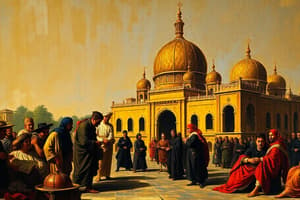Podcast
Questions and Answers
What is a dhow?
What is a dhow?
- A lateen-rigged sailing vessel used by Arabs (correct)
- A type of desert footwear
- A crafting technique
- A traditional Arab food dish
Who was Al-Mahdi?
Who was Al-Mahdi?
Third of the Abbasid caliphs who attempted to reconcile moderates among Shi'a to the Abbasid dynasty.
Who is considered the most famous of the Abbasid caliphs?
Who is considered the most famous of the Abbasid caliphs?
Harun al-Rashid
What are emissaries?
What are emissaries?
What is The Thousand and One Nights?
What is The Thousand and One Nights?
Who was Al-Ma'mun?
Who was Al-Ma'mun?
What is a mercenary?
What is a mercenary?
What is a harem?
What is a harem?
What is a concubine?
What is a concubine?
What is a eunuch?
What is a eunuch?
What are the Buyids?
What are the Buyids?
Who were the Seljuk Turks?
Who were the Seljuk Turks?
What were the Crusades?
What were the Crusades?
Who was Saladin?
Who was Saladin?
What is taffeta?
What is taffeta?
Who is defined as a Muslim?
Who is defined as a Muslim?
What is muslin?
What is muslin?
What is damask?
What is damask?
What is a tapestry?
What is a tapestry?
Who was Omar Khayyam?
Who was Omar Khayyam?
Who was Firdawsi?
Who was Firdawsi?
What are the ulama?
What are the ulama?
Who was Al-Ghazali?
Who was Al-Ghazali?
What is Sufism?
What is Sufism?
Who were the Mongols?
Who were the Mongols?
Who was Hulegu?
Who was Hulegu?
Who is Chinggis Khan?
Who is Chinggis Khan?
What is Harappa?
What is Harappa?
What was the Gupta dynasty?
What was the Gupta dynasty?
What is a subcontinent?
What is a subcontinent?
What is Hinduism?
What is Hinduism?
What is the caste system?
What is the caste system?
What is a hierarchy?
What is a hierarchy?
Who was Muhammad ibn-Qasim?
Who was Muhammad ibn-Qasim?
What is Brahman in Hinduism?
What is Brahman in Hinduism?
Who are the Rajas?
Who are the Rajas?
Who was Mahmud of Ghazni?
Who was Mahmud of Ghazni?
Who was Muhammad of Ghur?
Who was Muhammad of Ghur?
Who is Qutb-ud-din Aibak?
Who is Qutb-ud-din Aibak?
What is a sultan?
What is a sultan?
What is sati?
What is sati?
What are bhaktic cults?
What are bhaktic cults?
Who was Mira Bai?
Who was Mira Bai?
What is Shrivijaya?
What is Shrivijaya?
What is Malacca?
What is Malacca?
Who was Kabir?
Who was Kabir?
What are Arabic numerals?
What are Arabic numerals?
Flashcards are hidden until you start studying
Study Notes
Maritime and Cultural Developments
- Dhow: A lateen-rigged sailing vessel utilized by Arabs, crucial for trade and navigation.
- The Thousand and One Nights: An influential collection of stories spanning Arab, Indian, and Persian cultures.
Abbasid Caliphate and Key Figures
- Al-Mahdi: Third Abbasid caliph; attempted to reconcile Shi'a conflicts but faced succession issues.
- Harun al-Rashid: Notable Abbasid caliph known for luxurious lifestyle and reliance on Persian advisors; his death triggered civil wars.
- Al-Ma'mun: Son of Harun al-Rashid; established the House of Wisdom and an observatory to advance astronomical studies.
Military and Political Changes
- Buyid Dynasty: Shi'ite dynasty that captured Baghdad in 945, ruling until 1055 and adopting the title of sultan.
- Seljuk Turks: Nomadic invaders who conquered Baghdad in 1055 and governed in the name of Abbasid caliphs.
- Crusades: Series of religious wars launched by European Christians from 1096-1270 to reclaim the Holy Land.
- Saladin: Muslim military leader renowned for his role in the Third Crusade and uniting Muslim forces.
Socio-Cultural Contexts
- Harem: Living quarters in Muslim households reserved for women, symbolizing the period's gender dynamics and subjugation.
- Ulama: Muslim scholars responsible for interpreting Islamic law and serving as the social backbone of urban Muslim communities.
Literature and Philosophy
- Omar Khayyam: Renowned Persian poet and philosopher, famous for "The Rubaiyat," celebrating simple joys.
- Firdawsi: Celebrated poet of the epic "Shah Nama," preserving a vast array of Persian history and mythology.
Religious Developments and Sufi Tradition
- Al-Ghazali: Influential Islamic theologian who sought to reconcile Greek philosophy with Islamic teachings.
- Sufi: A mystical branch of Islam emphasizing a personal connection with Allah, often through poetry and rituals.
Mongol Expansion
- Mongols: Central Asian group that created the largest contiguous empire under Genghis Khan, impacting regions across Eurasia.
- Hulegu: Grandson of Genghis Khan, responsible for the 1257 destruction of Baghdad, significantly altering Islamic history.
Indian Subcontinent Dynamics
- Gupta Dynasty: Reign (320-550 C.E.) marked by a cultural renaissance in India following the Mauryan collapse.
- Caste System: Rigid social hierarchy defining individuals’ roles and interactions in Hindu society.
- Muhammad ibn-Qasim: Arab general who annexed Sind, marking the early Islamic foothold in India.
- Mahmud of Ghazni: Turkish leader known for his wealth-focused campaigns in the Indian subcontinent (997-1030).
Religion and Society in India
- Sati: Hindu practice where a widow self-immolates on her husband's funeral pyre, reflecting societal norms about women.
- Bhaktic Cults: Hindu sects that emphasize personal devotion to deities, often accessible to women, as seen in the poetry of Mira Bai.
Trade Empires in Southeast Asia
- Shrivijaya: A prominent trading empire that facilitated commerce in the Malacca Straits while resisting Muslim influence before its decline.
- Malacca: Significant trading port established around 1400, pivotal for commerce in Southeast Asia.
Mathematical Contributions
- Arabic Numerals: Number system developed during the Gupta period in India and later adopted by the Islamic Empire, widely used in modern civilization today.
Studying That Suits You
Use AI to generate personalized quizzes and flashcards to suit your learning preferences.




